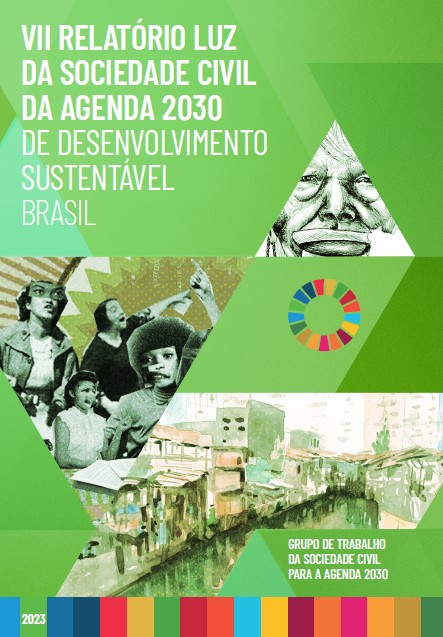Brazil backtracks on UN water and sanitation goals, reveals the 2023 VII Spotlight Report
UN goals such as expanding access to vulnerable populations and integrated management of water resources went backwards in Brazil in 2022
Published in 03 Oct 2023
Written by By the IAS team
Tags:

Brazil has backtracked on more than 60% of the targets that make up the 17 Sustainable Development Goals (SDGs), a United Nations guideline document to achieve a more sustainable and less unequal world by 2030. Among them there are several related targets to water and sanitation.
The data comes from the 7th Civil Society Spotlight Report of the 2030 Agenda for Sustainable Development in Brazil, a study prepared by 41 civil society organizations, including the IAS (Water and Sanitation Institute). The document was launched on September 25, in a ceremony at the General Secretariat of the Presidency of the Republic, in Brasília, with the participation of ministries, public institutes and representatives of civil society.
According to the report, 102 targets (60.35%) of the Sustainable Development Goals (SDGs) are in a negative situation when compared to the previous period, 14 (8.28%) are threatened, 16 (9.46%) have stagnated, and 29 (17.1%) have insufficient development. Only three (1.77%) show satisfactory progress, while four (2.36%) do not have sufficient data for classification.
Directly related to the activities of the IAS, SDG 6 establishes the importance of ensuring the availability and sustainable management of water and sanitation for everyone. SDG 6 has a direct impact on nine of the 17 SDGs (1, 3, 5, 7, 10, 11, 13, 14 and 15). o ODS 6 estabelece a importância de se assegurar a disponibilidade e gestão sustentável da água e saneamento para todas as pessoas. O ODS 6 tem impacto direto em nove dos 17 ODS (1, 3, 5, 7, 10, 11, 13, 14 e 15).
Despite this importance, SDG 6 failed in 2022 in Brazil: four of its targets that were threatened in 2020 (6.2, 6.3, 6.4 and 6.5) regressed and were stagnant.
Target 6.2 is to ‘achieve access to adequate and equitable sanitation and hygiene for all and end open defecation, with special attention to the needs of women and girls and those in vulnerable situations’. Target 6.3 aims to ‘implement integrated management of water resources at all levels, including via transboundary cooperation, as appropriate’. Both went backwards, the report states.
Among Brazil's challenges to reach its goals, the document highlights the urgent need to identify the true situation of lack of sanitation as ‘the available data does not reach the entire Brazilian population’ in order to plan integrated responses for all of Brazil.
The Spotlight Report highlights that current service provision contracts for urban areas do not usually include outskirts, favelas, stilt houses and rural areas, harming any process of universal sanitation. The first of the document's recommendations is to look at ‘marginalized and vulnerable populations’. Another recommendation prioritizes care for women and girls and ‘areas where the services provided result in a more positive and broad socioeconomic impact’.
In 2024, the Brazilian government will again report on the implementation of the 17 goals, which has not been done for six years. During this period, in the absence of the State, civil society organizations met to present the 2030 Agenda Spotlight Report.



